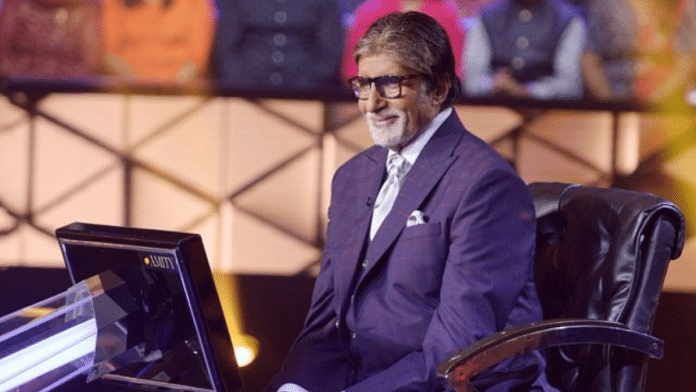New Delhi: The Nutrition Advocacy in Public Interest-India (NAPi) has written to Kaun Banega Crorepati (KBC) host and Bollywood star Amitabh Bachchan, calling the actor’s recent endorsement of a biscuit brand “misleading”.
NAPi is a group of independent experts in epidemiology, human nutrition, community nutrition and paediatrics.
The experts in their letter pointed to a purported YouTube clip from a recent KBC Junior episode, where Bachchan appears to be saying that mothers do not need to struggle to make nutritious food for their kids anymore, as ‘Britannia Milk Bikis’ biscuits have the power of milk and atta (wheat).
The clip has now been removed from YouTube.
In the letter, dated 28 December, NAPi wrote: “We are shocked and surprised to learn that you have chosen to endorse ‘Britannia Milk Bikis’ biscuits on a children’s TV programme. We would like to draw attention to the fact that the advertisement for the biscuit brand misleads consumers by equating an unhealthy, ultra-processed and pre-packaged food product, which is an industrial formulation, with real foods like ‘Atta Roti’ and ‘A Glass of Milk’.”
The association further pointed out that the Food Safety and Standards Act 2006 prohibits misleading advertisements of food products. Moreover, the Consumer Protection Act 2019, in Section 2 (28), says “misleading advertisement” in relation to any product or service means an advertisement which — (i) falsely describes such product or service; or (ii) gives false guarantee to or is likely to mislead the consumers as to the nature, substance, quantity or quality of such product or service; and (iv) deliberately conceals important information, stated the letter.
The NAPi letter claimed ‘Britannia Milk Bikis’ falls in the category of Ultra-Processed Foods (UPF).
According to the WHO Nutrient Profiling Model for South-East Asia Region, this category of food should not have more than six grams of sugar, eight grams of fat and 250 milligrams of sodium per 100 grams of the product. The WHO advises that food products that cross this limit should not be advertised for children.
“Britannia Milk Bikis Biscuit, on the other hand, exceeds all three criteria and is a high-sugar, high-fat, and high-sodium product. It contains 23.4 g of sugar per 100 g, 17.8 g of fat, and 287 mg of sodium per 100 g,” claimed NAPi in the letter.
Consumption of such products can lead to obesity and type-2 diabetes, and also lead to lifestyle diseases in later life, the association added.
Responding to ThePrint’s questions on the issue, a Britannia spokesperson said, “Britannia is among the most-trusted food brands, with a 100-plus-year-old legacy of quality products. We are the first company in India to have zero transfats in our products. Over 50 per cent of our portfolio is enriched with essential micro-nutrients that nourish the body.”
The spokesperson added: “As one of India’s leading food companies, our priority is to provide consumers with products that are safe, meet all regulatory requirements and fulfil our high standards of quality.”
However, the company did not respond to specific queries about whether it was responsible for writing Bachchan’s script for the ad.
Meanwhile, speaking to ThePrint, Arun Gupta, paediatrician and NAPi convenor, said they are yet to receive a response from Bachchan to their letter. “We have now sent a follow-up letter with all the supporting documents to show why such products are unhealthy,” he added.
“For the past five years, we have been writing to celebrities to stop endorsing unhealthy food items, but we hardly ever get a response,” Gupta claimed.
Also read: Not always a stroke of genius: Decoding decades of Indian advertisements
Calling out celebs
According to Gupta, in 2018, NAPi had called out Bachchan for advertising Horlicks as a health drink, when the product had high sugar levels. Although no official response came from the actor, claimed the paediatrician, he has since stopped endorsing Horlicks.
Similarly, the group had asked cricketer Sachin Tendulkar to stop endorsing Coca-Cola. “Although we got no response from him, Tendulkar stopped appearing in soft drink ads since he became a Member of Parliament,” Gupta said.
The NAPi Wednesday sent its second letter to Bachchan asking him to end his endorsement of the Britannia product.
The danger of UPFs
According to the UN Food and Agricultural Organisation (FAO), UPFs are formulations of ingredients, mostly of exclusive industrial use, typically created by a series of industrial techniques and processes.
“While manufacturing UPFs, the food matrix is ripped off its structure, e.g. fibre is removed, colours, flavours, emulsifiers and other additives are frequently added, to make the final product palatable or hyper-palatable and sell more, making it cheap and last long on the shelf,” Gupta said.
He added: “Further it is wrapped in sophisticated and attractive packaging. Accompanied by misleading advertising, UPFs (become) mainstream and modern foods. It certainly adds to increased consumption of UPFs in our diets.”
Some common examples of UPFs are carbonated soft drinks, sweet, fatty or salty packaged snacks, candies (confectionery), mass-produced packaged breads and buns, cookies (biscuits), pastries, cakes and cake mixes, margarine and other spreads, sweetened breakfast ‘cereals’ and fruit yoghurt and ‘energy’ drinks, pre-prepared meat, cheese, pasta and pizza dishes, poultry and fish ‘nuggets’ and ‘sticks’, sausages, burgers, hot dogs and other reconstituted meat products; powdered and packaged ‘instant’ soups, noodles and desserts and baby formula.
NAPi has been monitoring the advertisements of UPFs and found them to be common on TV, social media and in newspapers. The existence of legislation to restrict misleading marketing has not helped much, it claimed.
This is an updated version of the copy.
(Edited by Nida Fatima Siddiqui)
Also read: Roz khao ande: When a pro-egg campaign was a hit with Indian vegetarians



